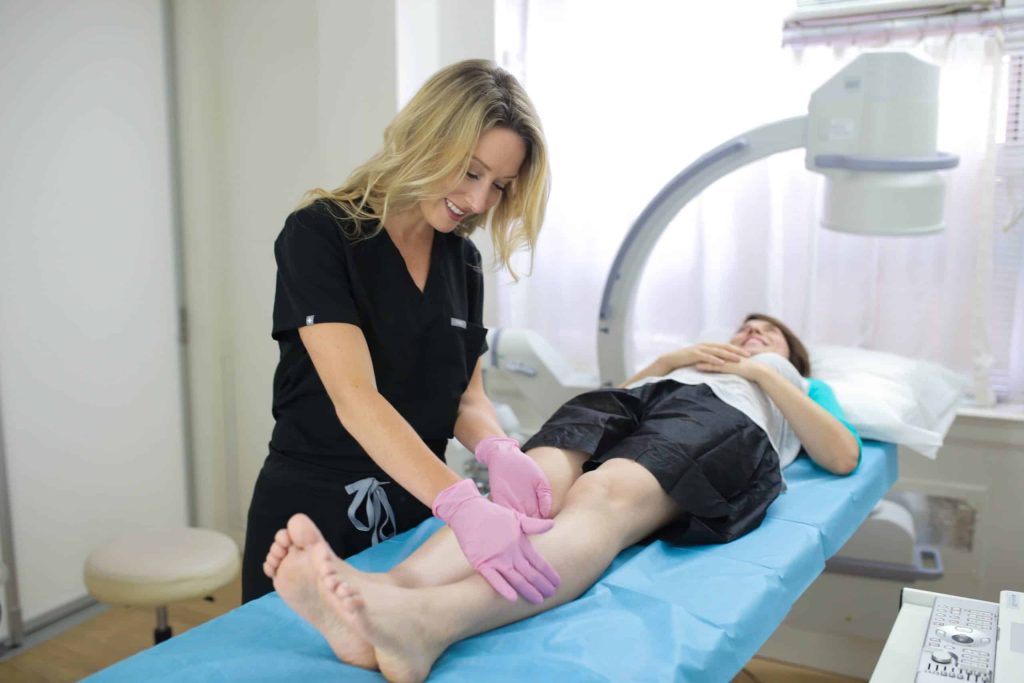Many patients wonder, “Can you get varicose vein treatment covered by insurance?” The answer is: yes—but it depends on the medical necessity of your condition. Insurance companies typically evaluate whether varicose vein treatment is cosmetic or medically required. If your veins cause symptoms like pain, swelling, or skin changes, your treatment is more likely to be covered.
Insurance companies such as Aetna, UnitedHealthcare, Blue Cross Blue Shield, and Cigna have specific guidelines for varicose vein treatment. These guidelines focus on diagnostic results (like a venous ultrasound), clinical symptoms (such as venous insufficiency), and a history of conservative treatment (like compression stockings). In short, your insurance provider will consider how severe your vein condition is before approving coverage.
How Do You Qualify for Insurance-Covered Vein Treatment?
To qualify for insurance-covered varicose vein treatment, your symptoms must be documented and evaluated by a vein specialist. In most cases, insurers require proof of the following:
- Persistent leg pain, swelling, cramping, or heaviness
- Venous reflux or insufficiency shown in a Doppler ultrasound
- Failed relief from conservative treatments (e.g., compression stockings for 6–12 weeks)
- Skin discoloration, ulcers, or bleeding due to varicose veins
If these conditions are met, insurance companies are more likely to approve procedures such as endovenous laser treatment (EVLT), sclerotherapy, or radiofrequency ablation.
When visiting a Vein Treatment New Jerseycenter, certified vein specialists will guide you through each step—from diagnosis to treatment and insurance paperwork.
Which Varicose Vein Treatments Are Typically Covered?
Insurance policies usually cover treatments considered medically necessary. These may include:
- Endovenous Laser Ablation (EVLA or EVLT)
This minimally invasive procedure uses laser energy to seal off faulty veins and redirect blood flow. EVLT is widely covered when symptoms interfere with your daily life. - Radiofrequency Ablation (RFA)
Similar to EVLT, RFA uses radiofrequency energy instead of lasers to close the vein. It is typically covered by insurance if venous reflux is diagnosed. - Ambulatory Phlebectomy
This surgical technique removes bulging veins through small skin punctures. It is covered if the veins cause skin ulcers, bleeding, or pain. - Ultrasound-Guided Foam Sclerotherapy
Although cosmetic sclerotherapy isn’t covered, ultrasound-guided sclerotherapy for larger or deeper veins often qualifies for insurance coverage. - Compression Therapy
Though not a permanent solution, compression stockings are often a first step in vein treatment and are partially reimbursed by insurance providers.
Cosmetic treatments like standard sclerotherapy for spider veins are not usually covered unless they are part of a medically necessary vein condition.
How Much Does Varicose Vein Treatment Cost Without Insurance?
The cost of varicose vein treatment can vary based on your location, the type of procedure, and whether it’s deemed cosmetic or medically necessary.
If you’re wondering how much does varicose vein treatment cost without insurance, here are average price ranges in the U.S.:
- EVLT or RFA: $2,000–$3,000 per leg
- Ambulatory Phlebectomy: $1,000–$3,000 depending on the number of veins
- Sclerotherapy: $300–$700 per session
- Compression Stockings: $50–$150 per pair
Patients at Vein Treatment New Jersey often start with a consultation to determine the severity and insurance eligibility. If your condition is purely cosmetic, you may need to pay out of pocket. However, when symptoms impact your quality of life, your insurance may step in to offset most costs.
How Can You Improve Your Chances of Insurance Approval?
Insurance companies require documentation to approve varicose vein procedures. Here’s how to improve your chances:
- Schedule a comprehensive evaluation at a certified vein clinic
- Get a Doppler ultrasound to identify venous reflux or insufficiency
- Document your symptoms—keep a record of leg pain, swelling, fatigue, and skin issues
- Follow conservative treatments like wearing compression stockings, elevating your legs, and avoiding prolonged standing
- Work with a Vein Treatment New Jersey center that specializes in medical necessity documentation and insurance pre-authorizations
Reputable vein clinics have insurance coordinators on staff who help navigate prior authorizations and reduce the burden on patients.
Does Medicare or Medicaid Cover Varicose Vein Treatment?
Yes, Medicare and Medicaid may cover treatment for varicose veins when deemed medically necessary. They follow the same criteria as private insurers, including:
- Presence of venous reflux
- Skin ulceration or pain
- Failed conservative treatments
However, coverage limits and required documentation may vary by state and plan, so you should always check with your provider or the vein clinic’s insurance team.
Why Choose a Specialized Vein Center?
Choosing a Vein Treatment New Jersey facility gives you access to board-certified vein specialists, state-of-the-art diagnostic tools, and insurance experts. These centers:
- Perform in-office diagnostic ultrasounds
- Provide same-day insurance verification
- Offer advanced, minimally invasive treatments
- Have high success rates and low recovery times
This focused expertise improves your odds of getting the right diagnosis and faster insurance approval.
What Should You Ask During Your First Consultation?
When visiting a vein clinic, ask the following:
- Is my condition likely to be covered by insurance?
- What diagnostic tests are required?
- What documents do I need to submit to my insurance?
- How much does varicose vein treatment cost if I’m not covered?
- Are payment plans available?
At Vein Treatment New Jersey, the care team answers these questions with transparency and ensures you understand your financial responsibility upfront.
Final Thoughts: Can You Afford Varicose Vein Treatment?
In many cases, you don’t have to pay the full cost of varicose vein treatment out of pocket. If your veins are causing discomfort, skin issues, or circulation problems, your insurance is more likely to approve treatment.
Understanding how much does varicose vein treatment cost with and without insurance helps you plan ahead. And by choosing a reputable Vein Treatment New Jersey center, you ensure the best care—and support in getting your treatment covered.
So yes, you can get varicose vein treatment covered by insurance, as long as you meet the right clinical criteria. Don’t ignore your symptoms—book a consultation and take the first step toward healthier legs today.







